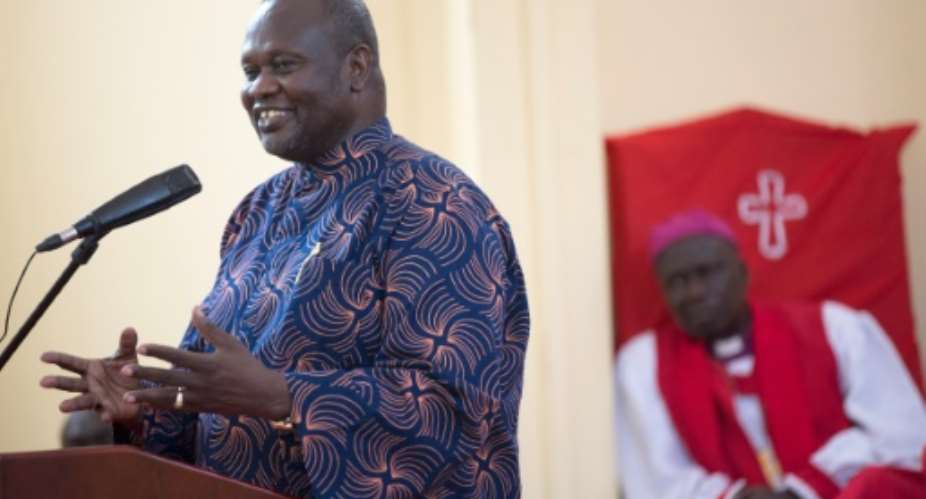Nairobi (AFP) - South Sudan's former rebel leader and ex-vice president Riek Machar has escaped to the neighbouring Democratic Republic of Congo following violent clashes last month, officials said Thursday.
His precise whereabouts remained unclear but a United Nations spokesman confirmed his presence in the country.
UN deputy spokesman Farhan Haq said Congolese authorities had asked the MONUSCO peacekeeping mission there to help transfer Machar and his family from a location near the border with South Sudan to elsewhere in DR Congo.
"MONUSCO (the UN's mission in DR Congo) became aware yesterday of the presence of Riek Machar in DRC and the DRC authorities requested MONUSCO to facilitate his extraction and transfer," Haq told reporters in New York.
"He has been handed over to the DRC authorities," he said, adding that the transfer was done for "humanitarian reasons" and "with his consent".
"We have provided him with whatever medical assistance he needs," Haq said, declining to give further details.
The UN mission in South Sudan had "no involvement" in Machar's departure, he added.
A source close to the matter told AFP that Machar could be in the northern city of Kisangani, but there was no official confirmation.
The UN spokesman said the agency did not know
A statement from Machar's SPLM-IO party said the leader had been "evacuated to a safe country within the region" without naming Congo.
A party source had earlier told AFP that Machar was in the Congolese capital Kinshasa but wanted "to go as soon as possible to Ethiopia".
Civil war broke out in South Sudan in December 2013 when President Salva Kiir accused Machar, then his deputy, of plotting a coup. The fighting has split the world's newest country along ethnic lines and driven it to the brink of collapse.
A peace deal signed between the government and rebels a year ago has so far failed to end the conflict. And last month Juba was rocked by several days of heavy fighting between Kiir's forces and those loyal to Machar.
Machar's whereabouts had been unclear since the fighting flared in Juba between July 8 and 11 and led to his outgunned and outnumbered forces being chased from the city by government troops.
He was subsequently replaced as vice president on July 25 by Taban Deng Gai, a former friend and ally.
Deng warned Wednesday that Machar should stay out of politics to allow peace despite previously indicating that if Machar returned to Juba he would stand aside.
- Cost of war -
If Machar is indeed seeking to travel to Ethiopia, a regional power broker that hosted peace talks through the trade bloc IGAD, it would suggest he has no intention of being cut out of negotiations or pushed from power.
Several former rebel commanders have warned they consider Deng's elevation to vice president to be "treason".
South Sudan's civil war has been characterised by war crimes and human rights abuses with civilians massacred -- often along tribal lines -- women and girls raped and children forced to become soldiers.
Homes and property have been looted and burned, and entire towns razed.
Tens of thousands of people have died and over two million have been forced from their homes.
In just the most recent documented atrocity a South Sudanese journalist was killed by government soldiers because of his tribe and foreign aid workers were shot, beaten and raped in an attack on a hotel during last month's fighting in Juba.
The targeting of foreigners spurred the United Nations to launch an investigation into why its peacekeepers failed to respond to calls for help while the attack was going on.
Last Friday the UN Security Council approved a US-drafted resolution to strengthen the 12,000-person peacekeeping mission with 4,000 additional troops drawn from regional armies and equipped with a more aggressive mandate.
Juba has yet to accept the resolution.





 Tuesday’s downpour destroys ceiling of Circuit Court '8' in Accra
Tuesday’s downpour destroys ceiling of Circuit Court '8' in Accra
 SOEs shouldn't compromise on ethical standards, accountability – Akufo-Addo
SOEs shouldn't compromise on ethical standards, accountability – Akufo-Addo
 Father of 2-year-old boy attacked by dog appeals for financial support
Father of 2-year-old boy attacked by dog appeals for financial support
 Jubilee House National Security Operative allegedly swindles businessman over sa...
Jubilee House National Security Operative allegedly swindles businessman over sa...
 Nobody can order dumsor timetable except Energy Minister – Osafo-Maafo
Nobody can order dumsor timetable except Energy Minister – Osafo-Maafo
 Mahama wishes National Chief Imam as he clock 105 years today
Mahama wishes National Chief Imam as he clock 105 years today
 J.B.Danquah Adu’s murder trial: Case adjourned to April 29
J.B.Danquah Adu’s murder trial: Case adjourned to April 29
 High Court issues arrest warrant for former MASLOC Boss
High Court issues arrest warrant for former MASLOC Boss
 Align academic curriculum with industry needs — Stanbic Bank Ghana CEO advocates
Align academic curriculum with industry needs — Stanbic Bank Ghana CEO advocates
 Election 2024: We'll declare the results and let Ghanaians know we've won - Manh...
Election 2024: We'll declare the results and let Ghanaians know we've won - Manh...
